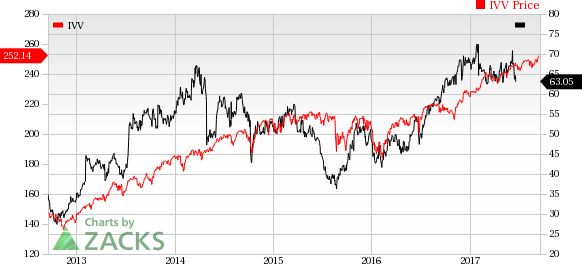Declining air fares have hurt airline stocks for quite some time now. In fact, the ticket prices decreased in almost every month of 2016, with the sharpest decline recorded in July. The same has been weak in 2017 as well.
Markedly, the August reading on air fares in the United States further highlights the scenario. Even though, the low air fares spell good news for fliers, it is likely to hurt the top line of airline companies.
What the Data Says
According to data released by the Bureau of Transportation Services, in the United States average air fares (adjusted) in August fell 3.2% from the comparable figure a year ago. Notably, the August reading marked the second successive month of price weakness. Also, air fares decreased 6.1% (unadjusted) in the same month on a month-on-month basis.
According to research firm Hopper, air fares (roundtrip) in the United States are likely hit a low of $216 in October. The reading in the current month is projected to be $217, down 2.1%, from the August figure.
Price War Between Legacy and Low-Cost Carriers
The emergence and subsequent success of low-cost carriers like Spirit Airlines (NASDAQ:SAVE) , JetBlue Airways Corporation (NASDAQ:JBLU) and Southwest Airlines Co. (NYSE:LUV) have rung alarm bells as far as the likes of Delta Air Lines (NYSE:DAL) , American Airlines Group (NASDAQ:AAL) and United Continental Holdings (NYSE:UAL) are concerned. In fact, the price war has contributed to the softness in ticket prices.
Furthermore, in a bid to attract budget conscious passengers, American Airlines and United Continental had introduced Basic Economy Fares (low-priced tickets) earlier in 2017. Recently, American Airlines expanded the offering in order to compete more effectively with low-cost carriers.
In fact, United Continental acknowledged the price war with discount carriers like Spirit as one of the reasons behind trimming its passenger unit revenue guidance for the third quarter.
Capacity Overexpansion
Capacity overexpansion may lead to oversupply in the market and is one of the contributing factors behind suppressed air fares.
The August traffic reports of the likes of JetBlue, Spirit and Allegiant Travel Company (NASDAQ:ALGT) revealed that capacity expanded at a higher pace than traffic. Consequently, load factor (percentage of seats filled by passengers) declined in the month at the above- mentioned carriers. Currently, Allegiant Travel carries a Zacks Rank #3 (Hold). You can see the complete list of today’s Zacks #1 Rank (Strong Buy) stocks here.
The July traffic reports also unveiled declining load factors for most carriers.
International Air Transport Association’s (“IATA”) forecast for 2017 further highlights the declining air fares in the United States. The association predicts capacity expansion of 4.4% in North America to be higher than 4% projected growth in passenger demand.
Oil Prices Still Weak
Despite the recent surge in oil prices, which might be due to affects of Harvey, the commodity is still trading at around $50 a barrel. We note that the level is way below the over $100 a barrel mark witnessed in 2014.
According to Hopper, even though Jet fuel prices increased 8.5% in August to $1.54, the reading was approximately half the high witnessed in February 2014. Soft oil prices are being cited as one of the main reasons for declining air fares.
Falling Airfares Contributes to Busy Labor Day
The sharp fall in air fares is an encouraging piece of news for fliers. In sync with this, soft ticket prices made air travel more affordable on Labour Day, thus attracting many fliers. This was, in fact, evident from the bullish Labor Day forecast by Airlines for America. According to the organization, approximately 16.1 million passengers were expected to be transported through U.S. airlines during the Labor Day holiday period this year, up 5% year over year.
Per the IATA, inflation-adjusted airfare had fallen 1% on a year-over-year basis in the first half of 2017, which further substantiates softness in ticket prices in the United States.
Conclusion
Given the present backdrop, we don’t expect an upsurge in ticket prices in the next few months. This, in turn, is likely to hurt the top line of airline stocks, thereby adding to the woes of carriers, which are already reeling under multiple tailwinds like high costs and weather-related disruptions. Whatever be the outcome, we anticipate investor focus to remain on this burning issue of air ticket prices, going forward.
New Report: An Investor’s Guide to Cybersecurity
Cyberattacks have become more frequent and destructive than ever. In fact, they’re expected to cause $6 trillion per year in damage by 2020.
The cybersecurity industry is expanding quickly in response to these threats. In fact, a projected $170 billion per year will be spent to protect consumer and corporate assets. Zacks has just released Cybersecurity: An Investor’s Guide to Locking Down Profits which reveals 4 promising investment candidates.
Download the new report now>>
Southwest Airlines Company (LUV): Free Stock Analysis Report
JetBlue Airways Corporation (JBLU): Free Stock Analysis Report
Delta Air Lines, Inc. (DAL): Free Stock Analysis Report
United Continental Holdings, Inc. (UAL): Free Stock Analysis Report
Spirit Airlines, Inc. (SAVE): Free Stock Analysis Report
Allegiant Travel Company (ALGT): Free Stock Analysis Report
American Airlines Group, Inc. (AAL): Free Stock Analysis Report
Original post
Zacks Investment Research

